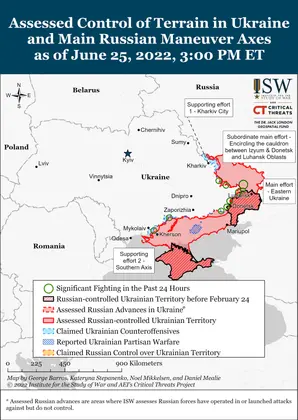Key Takeaways
- The Russian Ministry of Defense stated that the leadership of its central and southern groups of forces fighting Ukraine has changed, confirming ISW’s previous assessment that the Russian high command is restructuring the leadership of operations in Ukraine.
- Ukrainian intelligence officials emphasized that Belarus remains highly unlikely to join the war in Ukraine.
- Ukrainian sources confirmed that Russian forces have taken full control of Severodonetsk and are fighting within Lysychansk.
- Russian forces made measured gains to the north and southeast of Bakhmut.
- Russian forces continued unsuccessful attempts to advance southeast of Izyum toward Slovyansk.
- Russian forces continued positional battles north of Kharkiv City.
- Russian forces attempted to strengthen their defensive lines and recapture lost positions on the Southern Axis.
The Russian Ministry of Defense (MoD) announced the commanders of the “central” and “southern” groupings of forces in Ukraine on June 24, confirming previously rumored changes reported on June 21. Spokesperson for the Russian MoD Igor Konashenkov stated on June 24 that Commander of the Central Military District Colonel General Alexander Lapin is in command of the “central” group of forces, which is responsible for operations against Lysychansk (and presumably Severodonetsk). Konashenkov additionally stated that Army General Sergei Surovikin, commander of the Russian Aerospace Forces, commands the ”southern” group of forces and oversaw the encirclement of Hirske and Zolote. The Russian MoD’s announcement confirms ISW’s assessment from June 21 that the Russian high command is reshuffling and restructuring military command in order to better organize operations in Ukraine, though the Russian MoD statement does not state when the changes occurred. The UK MoD confirmed that the Russian command has removed several generals from key operational roles in Ukraine, including Commander of the Airborne Forces (VDV) Colonel General Andrei Serdyukov and Commander of Russia’s Southern Military District Alexander Dvornikov, who was likely was acting as overall theatre commander. The UK MoD noted that command of the Southern Military District will transfer to Surovikin. The Russian MoD’s statement notably only discusses the center and south force groupings (not the Southern Military District as a whole), but Dvornikov has likely been removed from his previous role.

Zelensky Meets CIA Director William Burns in Ukraine
JOIN US ON TELEGRAM
Follow our coverage of the war on the @Kyivpost_official.
Russian forces conducted an abnormally large series of missile strikes against Ukrainian rear areas on June 25. The Ukrainian Airforce Command reported that Russian forces fired over 50 ground-, air-, and sea-based missiles at Ukraine and targeted areas in Zhytomyr, Kyiv, Khmelmytskyi, Chernihiv, Lviv, Mykolaiv, Kharkiv, and Dnipropetrovsk oblasts.[8] The Ukrainian Main Intelligence Directorate (GUR) reported that six Russian Tu-22M3 bombers departed from the Shaykova airbase in Belarus and launched 12 Kh-22 cruise missiles at land targets in Kyiv, Sumy, and Chernihiv Oblasts, which is the first such launch from Belarus.[9] The Ukrainian Airforce Command noted that Russian forces used sea-based Kalibr missiles against targets in western Ukraine, X-22 and ground-based Iskander and Tochka-U missiles against targets in northern Ukraine, and ONYX missiles and Bastion complexes against targets in southern Ukraine. Ukrainian air defense reportedly shot down many of the missiles, which were likely intended to target critical support infrastructure in areas of Ukraine where there is no direct combat.
Ukrainian intelligence assessed that the Kremlin is continuing covert partial mobilization efforts in support of what it increasingly recognizes as a war of attrition in Eastern Ukraine. Representative of the Ukrainian Main Intelligence Directorate (GUR) Vadym Skibitsky stated that the Kremlin recognizes it is waging a war of attrition and is conducting secretive partial mobilization efforts while additionally mobilizing the BARS (Combat Army Reserve of the Country) system and other constant-readiness elements. Skibitsky noted that 105 battalion tactical groups (BTGs) are taking part in the war in Ukraine and that Russian reserve capabilities could increase this number to anywhere between 150 and 160 BTGs but did not specify a timeframe for this mobilization. Skibitsky reiterated that the Kremlin’s main goal is to secure control of the entire Donbas and that its secondary priority is consolidation of its control of Kherson Oblast by September 11, when the Kremlin seeks to hold referenda to directly annex territories or create quasi-state “People’s Republics.” The Kremlin intends to conduct a protracted conflict in Ukraine and is seeking to advance mobilization efforts to support long-term military and political goals in occupied areas of Ukraine.
Ukraine’s Main Intelligence Directorate (GUR) firmly stated that Belarusian involvement in the war in Ukraine on behalf of Russia remains highly unlikely. GUR representative Vadym Skibitsky stated that Belarusian forces will not attack Ukraine without the support of Russian troops, of which there are approximately 1,500 in Belarus. Skibitsky noted that Belarus has seven BTGs on a rotating basis near the border with Ukraine and that the formation of a Russian-Belarusian joint shock group would take three to four weeks, with two to three weeks needed to simply deploy sufficient Russian forces into Belarus. The GUR’s statement reaffirms ISW’s previous assessments that, while recent Belarusian actions along the Ukrainian border are threatening and likely intended to fix Ukrainian forces in place with the threat of Belarusian action, they are highly unlikely to preempt actual involvement in the war.
Authors: Karolina Hird, Mason Clark, and George Barros
Read the full report here.
You can also highlight the text and press Ctrl + Enter






